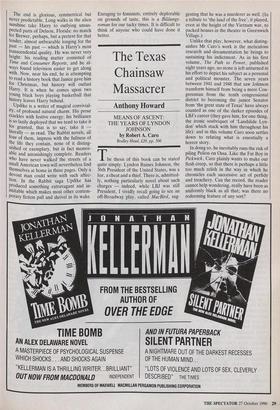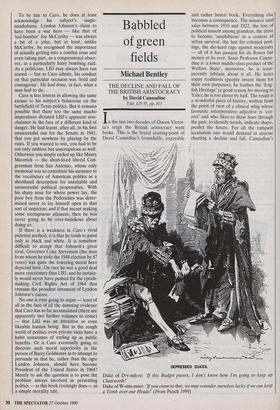The Texas Chainsaw Massacrer
Anthony Howard
MEANS OF ASCENT: THE YEARS OF LYNDON JOHNSON by Robert A. Caro
Bodley Head, f20, pp. 506
The thesis of this book can be stated quite simply: Lyndon Baines Johnson, the 36th President of the United States, was a liar, a cheat and a thief. There is, admitted- ly, nothing particularly novel about such charges — indeed, while LBJ was still President, I vividly recall going to see an off-Broadway play, called MacBird, sug-
gesting that he was a murderer as well. (In a tribute to 'the land of the free', it played, even at the height of the Vietnam war, to packed houses in the theatre in Greenwich Village.)
Unlike that play, however, what disting- uishes Mr Caro's work is the meticulous research and documentation he brings to sustaining his indictment. As in his first volume, The Path to Power, published eight years ago, no stone is left unturned in his effort to depict his subject as a personal and political monster. The seven years between 1941 and 1948 that saw Johnson transform himself from being a mere Con- gressman from the tenth congressional district to becoming the junior Senator from 'the great state of Texas' have always counted as one of the darker episodes of LBJ's career (they gave him, for one thing, the ironic soubriquet of 'Landslide Lyn- don' which stuck with him throughout his life): and in this volume Caro soon settles down to relating what is essentially a horror story.
In doing so, he inevitably runs the risk of piling Pelion on Ossa. Like the Fat Boy in Pickwick, Caro plainly wants to make our flesh creep, so that there is perhaps a little too much relish in the way in which he chronicles each successive act of perfidy and treachery. Can the record, the reader cannot help wondering, really have been as uniformly black as all that; was there no redeeming feature of any sort? To be fair to Caro, he does at least acknowledge his subject's single- mindedness. Lyndon Johnson's claim to have been a war hero — like that of `tail-bomber' Joe McCarthy — was always a bit of a joke, but at least, unlike McCarthy, he recognised the importance of actually getting into a combat zone and even taking part, as a congressional obser- ver, in a particularly hairy bombing raid. As a politician, LBJ may always have run scared — but as Caro admits, his conduct on that particular occasion was 'bold and courageous'. He had done, in fact, what a man had to do.
Caro is less lenient in allowing the same excuse to his subject's behaviour on the battlefield of Texas politics. But it remains possible that there too the same macho imperatives dictated LBJ's apparent non- chalance in the face of a different kind of danger. He had learnt, after all, in his first unsuccessful run for the Senate in 1941, that you got nowhere by playing by the rules. If you wanted to win, you had to be not only ruthless but unscrupulous as well. Otherwise you simply ended up like Maury Maverick — the short-lived liberal Con- gressman from San Antonio, whose only memorial was to contribute his surname to the vocabulary of American politics as a shorthand description for unreliable and unsuccessful political propensities. With his sharp nose for where power lay, the poor boy from the Pedernales was deter- mined never to lay himself open to that sort of suspicion; and if that meant making some incongruous alliances, then he was never going to be over-fastidious about doing so.
If there is a weakness in Caro's vivid pictorial method, it is that he tends to paint only in black and white. It is somehow difficult to accept that Johnson's great rival, Governor Coke Stevenson (the man from whom he stole the 1948 election by 87 votes) was quite the towering moral hero depicted here. On race he was a good deal more reactionary than LBJ; and he certain- ly would never have pushed for the epoch- making Civil Rights Act of 1964 that remains the proudest ornament of Lyndon Johnson's career.
No one is ever going to argue — least of all in the face of all the damning evidence that Caro has so far accumulated (there are apparently two further volumes to come) — that LBJ was an attractive or even likeable human being. But in the rough world of politics even private vices have a habit sometimes of ending up as public benefits. Or is Caro eventually going to discover such moral superiority in the person of Barry Goldwater as to attempt to persuade us that he, rather than the ogre Lyndon Johnson, should have become President of the United States in 1964? Merely to ask the question is to pose the problem always involved in presenting politics — as this book rivetingly does — as a simple morality tale.



































































 Previous page
Previous page